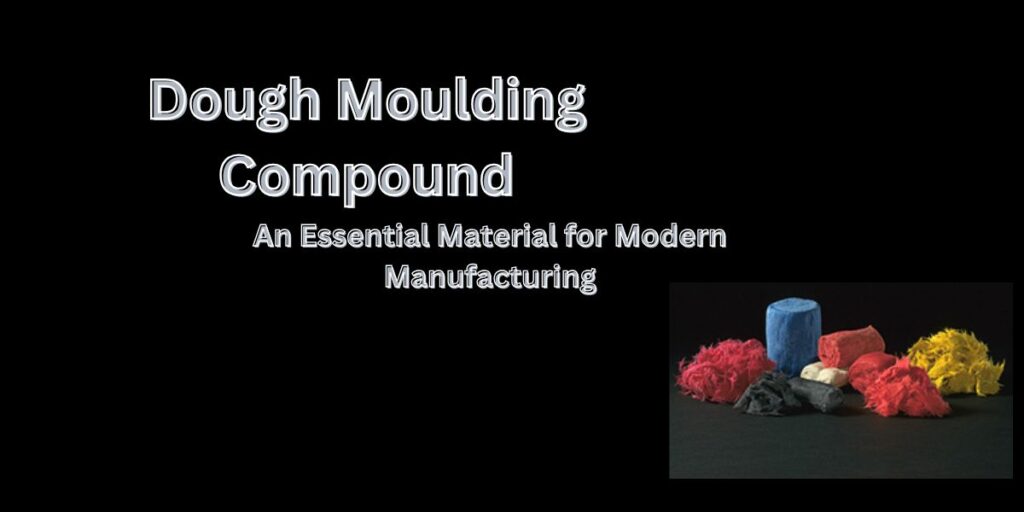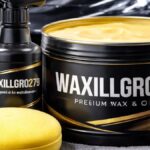Dough Moulding Compound (DMC) is a versatile thermoset material used extensively in the manufacturing of industrial components. Its unique properties, such as high strength, heat resistance, and electrical insulation, make it a preferred choice for various applications, particularly in the automotive, electrical, and appliance industries. DMC is known for its ability to be molded into complex shapes and designs, making it ideal for mass production of parts that require high precision and durability.
In this article, we’ll explore the key characteristics, advantages, applications, and future trends of Dough Moulding Compound. Whether you are a manufacturer, engineer, or someone looking to understand this material more thoroughly, this comprehensive guide will provide valuable insights into DMC’s role in modern manufacturing processes.
What is Dough Moulding Compound?
Dough Moulding Compound is a type of thermosetting plastic that is formed from a mixture of reinforcing fillers, resin, and other additives. The dough-like consistency of the compound allows it to be easily molded into complex shapes under heat and pressure, which is why it is widely used in industries that require high-performance components.
Once the compound is molded, it undergoes a curing process, which makes it hard and durable, while retaining its original shape. The curing process is what sets DMC apart from thermoplastics, which can be reshaped or remolded when heated. DMC, on the other hand, forms a permanent bond during the curing stage, ensuring the final product’s integrity and longevity.
Properties of Dough Moulding Compound
Dough Moulding Compound possesses several properties that make it highly suitable for industrial applications. Some of the key characteristics include:
Durability and Strength
DMC is known for its excellent mechanical properties, such as high tensile strength and resistance to impact. These attributes make it ideal for parts that need to withstand heavy loads and harsh operating conditions.
Heat Resistance
Dough Moulding Compound has a high heat distortion temperature, making it resistant to thermal degradation even at elevated temperatures. This property is particularly valuable in applications where components are exposed to heat or flame.
Electrical Insulation
The insulating properties of DMC make it an excellent choice for electrical and electronic applications. It can withstand high voltages and provide reliable insulation for wiring and electrical components.
Corrosion and Chemical Resistance
DMC is resistant to many chemicals, including oils, solvents, and acids. This makes it suitable for parts used in harsh chemical environments, such as automotive or industrial applications.
Molding Versatility
DMC can be easily molded into a variety of shapes and sizes, which allows manufacturers to produce complex, customized components. Its dough-like consistency makes it easy to handle and shape during the production process.
Manufacturing Process of Dough Moulding Compound
The manufacturing process of DMC involves several stages, each critical to ensuring the final product’s quality and performance. Below are the main steps involved in creating Dough Moulding Compound:
Step 1: Preparation of Ingredients
The first step in the DMC production process is preparing the raw materials. This typically includes a base resin, reinforcing fillers (such as glass fibers), pigments, and curing agents. The resin is usually a polyester or epoxy, which provides the plasticity and strength needed for molding.
Step 2: Mixing and Kneading
The prepared ingredients are mixed together to form a dough-like consistency. This step is critical for ensuring that the reinforcing fillers are evenly distributed throughout the resin. The mixture must be kneaded thoroughly to achieve uniformity in texture and consistency.
Step 3: Molding
Once the dough is prepared, it is placed into a mold where it is subjected to heat and pressure. The molding process allows the DMC to take the desired shape and size of the part. The temperature and pressure applied during this stage are crucial for ensuring the material achieves the right level of curing and hardness.
Step 4: Curing
The final step involves curing the molded material. This process, which can take several hours depending on the formulation and thickness of the material, ensures that the DMC hardens and retains its shape. During curing, the resin undergoes a chemical reaction that solidifies the compound, making it permanent and highly durable.
Advantages of Using Dough Moulding Compound
The use of Dough Moulding Compound offers several advantages for manufacturers and industries. Here are some of the key benefits:
High Productivity
DMC can be mass-produced efficiently, which reduces manufacturing time and labor costs. The ability to mold complex shapes quickly and consistently makes DMC ideal for large-scale production.
Reduced Waste
Unlike traditional molding methods that may produce excess material, DMC’s dough-like consistency allows for precise control over the amount of material used, reducing waste and maximizing material efficiency.
Cost-Effective
Given its excellent mechanical and thermal properties, DMC provides a cost-effective solution for manufacturing high-performance components. It is often less expensive than alternative materials, such as metals, while offering similar or superior properties.
Customizability
DMC can be easily customized in terms of color, shape, and material properties. Manufacturers can adjust the formulation to meet specific performance requirements, allowing for flexibility in design and production.
Minimal Post-Processing
Once molded and cured, DMC components typically require minimal post-processing. The smooth surface finish and high precision achieved during molding reduce the need for additional machining or finishing, saving time and costs.
Applications of Dough Moulding Compound
Dough Moulding Compound has found wide application across various industries due to its versatile properties. Some of the most common applications include:
Automotive Industry
In the automotive sector, DMC is used to produce components such as electrical connectors, switch gears, and parts of the bodywork. The material’s heat resistance and electrical insulation properties make it ideal for applications under the hood or within the electrical systems of vehicles.
Electrical Industry
DMC is commonly used for manufacturing electrical insulators, circuit breakers, and other electrical components. Its ability to withstand high voltages and its excellent insulating properties make it a critical material in ensuring the safety and efficiency of electrical systems.
Household Appliances
In the appliance industry, DMC is used in the production of parts such as electrical switchgear, housings, and control panels. Its resistance to heat and chemicals makes it ideal for use in devices that are exposed to extreme conditions.
Industrial Machinery
Dough Moulding Compound is used in industrial machinery to produce gears, bearings, and other parts that require high strength and durability. Its resistance to wear and tear, along with its ability to handle high temperatures, makes it a popular choice for industrial equipment.
Consumer Electronics
DMC is also used in the production of parts for consumer electronics, including mobile phone casings, electrical connectors, and circuit components. The material’s ability to be molded into intricate designs while offering reliable performance makes it suitable for these high-demand applications.
Future Trends in Dough Moulding Compound
As industries continue to evolve, the demand for materials like Dough Moulding Compound is likely to increase. Key trends to watch include:
Sustainable DMC Solutions
With growing concerns about environmental impact, manufacturers are working on developing more sustainable versions of DMC. This includes the use of bio-based resins and recyclable fillers to make the compound more eco-friendly.
Advancements in Material Formulations
Researchers are continuously developing new formulations for DMC that offer enhanced properties, such as improved flame resistance, higher strength, or better electrical conductivity. These innovations are expected to open up new applications for DMC across various industries.
Increased Use in 3D Printing
The potential for 3D printing with Dough Moulding Compound is another exciting trend. As additive manufacturing technologies advance, it is possible that DMC will be used for producing highly complex, custom parts with greater precision and reduced waste.
Conclusion
Dough Moulding Compound (DMC) is a highly versatile and durable material that plays a critical role in a wide range of industries. From automotive to electronics, its ability to be molded into complex shapes while offering superior heat, electrical, and chemical resistance makes it an essential material for modern manufacturing. With ongoing advancements in DMC formulations and the growing emphasis on sustainability, this material will continue to evolve, offering even more opportunities for innovation and application.
FAQs
What is Dough Moulding Compound made of?
Dough Moulding Compound is made from a mixture of resin, reinforcing fillers like glass fibers, curing agents, and other additives. This combination gives the material its dough-like consistency, which can be molded and cured into durable, heat-resistant components.
What industries use Dough Moulding Compound?
Dough Moulding Compound is used in industries such as automotive, electrical, household appliances, industrial machinery, and consumer electronics due to its strength, durability, and insulating properties.
What are the advantages of using Dough Moulding Compound?
DMC offers advantages like high strength, heat resistance, electrical insulation, cost-effectiveness, and minimal waste during production. It is also highly customizable for specific applications.
Is Dough Moulding Compound environmentally friendly?
While traditional DMC formulations are not inherently eco-friendly, there is ongoing research into more sustainable versions that use bio-based resins and recyclable fillers to reduce environmental impact.
Can Dough Moulding Compound be used for 3D printing?
Yes, Dough Moulding Compound is being explored for use in 3D printing, where it could offer precision and customization for manufacturing complex parts with minimal waste.







